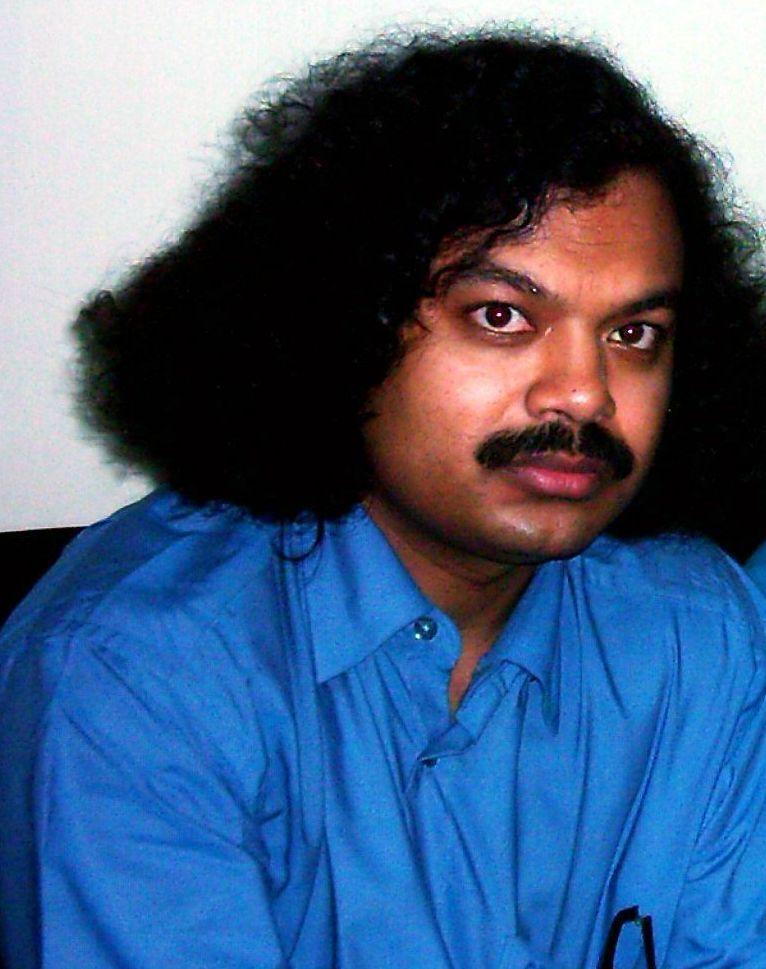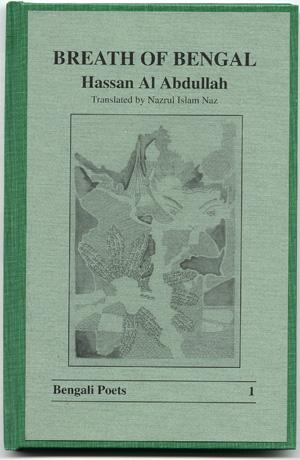Hassanal Abdullah

Hassanal Abdullah


|
BREATH OF BENGAL inspires with its crafted imagery and gentle narrativesby Mindy KronenbergBREATH OF BENGAL, by Hassanal Abdullah, translation by Nazrul Islam Naz, Cross Cultural Communications, Merrick, NY, 48 pp, $5.00 Paper, $15.00 Hardcover I met Hassanal Abdullah at the 2000 Geraldine Dodge Poetry Festival while we waited on line to have poet Stanley Kunitz sign our books. Hassanal attended the renown festival with his publisher, Stanley Barkan, who was eager to bring attention to BREATH OF BENGAL, one in a series of books by Bengali poets. It is a slim volume that is abundant with inspired images and a broad spectrum of emotions. Printed in both Bengali (on the left side) and English, the very appearance of the text gives the book an exotic feel and gives the reader a visual appreciation for the original language. The poems in Bengali sweep across the page like a filigree gate, an intriguing doorway to the narratives and tales of the English versions. In several poems, footnotes clarify geographic locations or references to native literary and historical figures or characters. But the work transcends the native landscape and cultural boundaries, political and social messages, and entertains with their universal musings. The journey starts "With a Little Cash," where dreams for solvency gradually lead to a desire for enlightenment and the nonmaterial pleasures that the world has to offer. It begins If I have a little cash, I will open an art shop My modernist call Will raise echo and journey To corners of places not reached before. Before long, money can buy the giant sky, and assure that birds will ease the restless narrator, waking and soothing him to sleep. Without the anticipated grief of life, The world will find my hands in its own If the crooked line of restlessness Is wiped away. With some money I will spend my time listening to the bees. The transformation of faith (and fear) is dealt with in "God's Home," where the idols of childhood with their red wide eyes/ Full of threats loom over the poet, who longs to walk on the horizon/ Away from their kingdom. Instead, over time, he discovers that the path to freedom is deceptive. Gods are still there, even more modern, Robust, with their feet on atomic spheres: Their cobwebs imprison my days. In fact I have not moved an inch from their kingdom. Even in the short poems, lines emerge like koans. In "Breast's Button," a brief but intense sexual reverie, a powerful question arises: With the strength of one's own freedom/ Can one destroy the desire of the other? Questions start a compact three-part poem, "Thorny Household," that builds from tangible speculation (Is love a box of kitchen matches/ To light the fire at dawn?) to consuming passion (…After a thousand burnings/ All that remains/ Is love/ And love alone.) The timeless intensity and frustration of love is poignantly presented in "Catastrophe: Soon After," where a phone call evolves into an incident of greater magnitude: --Do you know the age of the earth? The scientists claim Four hundred-and-fifty million years. Don’t think The ways of loving have changed. The wistful elements in "Colorless Night," and "Frustrations Belly," reveal Abdullah's skill in turning frustration into powerful vision. In the first, a sleepless night evokes romantic visions that bring the poet to his poetry writing book, to capture images that now only hover like a shadow in his memory. The second work painfully describes the poet’s emotional struggle, as quarry mauled by a predator, and finally devoured as a frog is swallowed/ Into the hungry stomach of a snake. Poems on poetry are borne out of a need for self expression and to help reckon with the enormous creative pressures of dealing with one's past and present. "Poetry, Come Back," could be an anthem for any writer who is entangled in the agonizing dance with the muse. In the middle of the night the poet calls out to her, to no avail; in the midst of a beautiful day he beckons her, and despite the birds' chorus, river's roaring flow, Poetry remains elusive. The poet asks Why has poetry deserted me? but understands that the separation is temporary. Poetry returns, with the promise that erases fear and guarantees forgiveness: And poetry says: 'I Love you, I will never leave you even for a moment.' And I reply, 'Beloved, in your absence I am abandoned, I am a beggar.' And then, resting breast-upon-breast, We paint red kisses. Poetry stays, so do I. "Pandora at the Mailbox," deals with poetry on a broader level, extolling the art while expressing a cynicism toward some of its modern practitioners in the new millenium: Holding poetry in one And the 20th Century in the other, I monitor the world, Gaze on your printed poems And on the weekend's preparation. A few are sincere, the majority rogues— Still, the bounty of literature available to the curious and hungry reader ultimately doesn't disappoint, and the poet predicts that both poetry and the 21st Century will grow wise with age. BREATH OF BENGAL inspires with its crafted imagery and gentle narratives. Hassanal Abdullah unselfishly shares his own pilgrimage with the reader, and when he declares I've walked far to the edge of salty, translucent memories, ("The Light of the Earth") we are there, witnessing each startling and glorious moment. Mindy Kronenberg is the editor of this publication. She teaches Writing and literature at SUNY Empire State College and is working on her second book of poems, The Gravity of Desire. from the Sept 2001 issue of Book/Mark Quarterly Review |